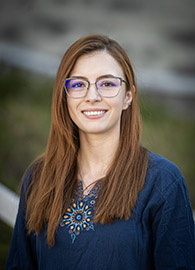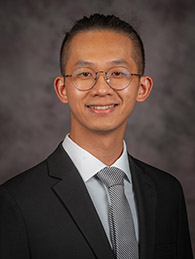Sarachek awards recognize outstanding doctoral candidates and support early career success
Wednesday, May 29, 2024
MANHATTAN — Two Kansas State University doctoral candidates have received Sarachek awards from the Graduate School for their academic and research achievements.
Bianca Morejon Viteri, doctoral candidate in microbiology, Quito, Ecuador, was awarded the $19,000 Alvin and RosaLee Sarachek Predoctoral Honors Fellowship in Molecular Biology. Kuan-Lun Ho, doctoral candidate in mechanical engineering, Zhubei City, Taiwan, was awarded the $1,500 Sarachek Scientific Travel Award.
Alvin and RosaLee Sarachek, Wichita, established the fellowship and travel awards to recognize resident graduate students enrolled in a doctoral program at Kansas State University who have demonstrated exceptional research and scholastic accomplishments. A selection committee composed of interdisciplinary graduate faculty determines the fellowship and award recipients. The awards program is offered through K-State's Graduate School.
Morejon's research aims to keep the world safe from diseases spread by mosquitos. Mosquitoes are responsible for approximately 750,000 human deaths annually. They are deadly due to their ability to transmit various diseases, including malaria, which is caused by parasites spread through the bites of infected mosquitoes. To fight pathogens, mosquitoes mount a vigorous immune response that is partially regulated by extracellular protease cascades. Morejon's dissertation research uses genetics, transcriptomics and gene co-expression analyses to investigate the role of protease cascades in overcoming infections in Anopheles gambiae, the African malaria mosquito.
"I have identified 27 proteases regulating the immune response, which control the infection outcome by enabling the mosquito to eliminate the infection rather than tolerate its negative impact," Morejon said.
The results of her research reveal a significantly expanded set of proteases, exceeding in number and complexity the molecular makeup of protease cascades known to regulate immunity in other animals, including humans.
"These findings not only enhance our fundamental understanding of immune system function but could also inform the design of novel malaria control strategies that prevent the parasite from reaching the human host," Morejon said.
Morejon will use the fellowship to support the transition to her next career phase. She has accepted an offer for a postdoctoral position in the Department of Immunology and Infectious Diseases at the Harvard T.H. Chan School of Public Health. The fellowship will also support her initial research there, which will focus on insect hormones in mosquito reproduction. The initial data she collects will form the basis of fellowship applications for early-career scientists. Kristin Michel, professor of biology, is Morejon's major professor.
Ho's research aims to develop point-of-care diagnostic devices and techniques for disease and pathogen detection. Specifically, he studies devices that use digital electro-microfluidics, or DEMF. For diagnostic devices, the microfluidic chip developed in Ho's research can manipulate droplets to perform a reverse transcription-quantitative polymerase chain reaction in a shorter time than commercial diagnostic machines. The current results show that different variants of SARS-CoV-2 can be detected and distinguished simultaneously using DEMF.
Additionally, Ho is working on the development of a novel droplet generation method called electro-emulsion for use in digital diagnostics. His goal is to use this technique for digital polymerase chain reaction detection of Shiga toxin-producing E. coli, a foodborne pathogen in ground beef, milk and vegetables. Using this digital approach, a higher sensitivity can be achieved compared to traditional diagnostics.
Ho will use the travel award to support his participation in the International Conference on Miniaturized Systems for Chemistry and Life Sciences, MicroTAS, which will be held in Canada from October 13-17. By attending this conference, Ho will have the opportunity to present his research, gain knowledge in his field of study and explore other potential research areas. Shih-Kang Fan, professor of mechanical and nuclear engineering, is Ho's major professor.
Alvin Sarachek received his doctorate in genetics from Kansas State University in 1957. He and his wife, RosaLee Sarachek, valued the university's tradition of offering a broad array of quality programs in the life sciences, many with outstanding national reputations. The Saracheks created the fellowship and travel awards because they wanted to contribute to the tradition of excellence by recognizing students who have demonstrated exceptional research accomplishments involving molecular approaches to biological problems.
More information on the Sarachek awards is available on the Graduate School website.


